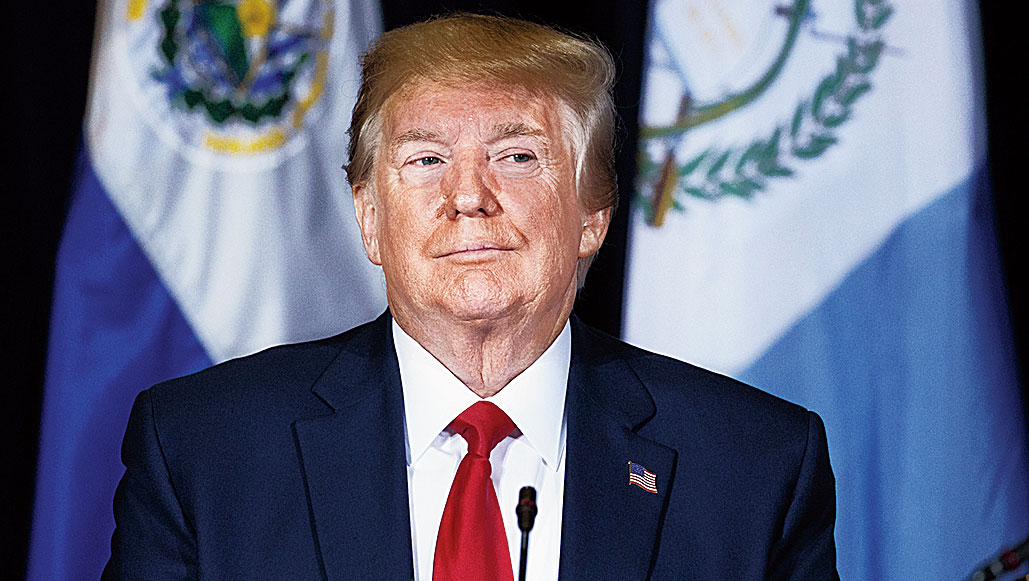The House of Representatives on Wednesday impeached President Trump for abuse of power and obstruction of Congress, making him the third President in history to be charged with committing high crimes and misdemeanours and face removal by the Senate.
On a day of constitutional consequence and raging partisan tension, the votes on the two articles of impeachment fell largely along party lines, after a bitter debate that stretched into the evening and reflected the deep polarisation gripping American politics in the Trump era.
Only two Democrats opposed the article on abuse of power, which accused Trump of corruptly using the levers of government to solicit election assistance from Ukraine in the form of investigations to discredit his Democratic political rivals. Republicans were united in opposition. It passed 230 to 197, with Speaker Nancy Pelosi gavelling the vote to a close from the House rostrum.
On the second charge, obstruction of Congress, a third Democrat joined Republicans in opposition. The vote was 229 to 198.
The impeachment votes set the stage for a historic trial beginning early next year in the Senate, which will have final say — 10 months before Trump faces re-election — on whether to acquit the 45th president or convict and remove him from office. The timing was uncertain, after Pelosi suggested late on Wednesday that she might wait to send the articles to the Senate, holding them out as leverage in a negotiation on the terms of a trial.
Acquittal in the Republican-controlled chamber may be likely, but the proceeding is certain to further aggravate the political and cultural fault lines in the country that Trump’s presidency has brought into dramatic relief.
Regardless of the outcome, the impeachment votes in the House put an indelible stain on Trump’s presidency that cannot be wiped from the public consciousness with a barrage of tweets or an angry tirade in front of thousands of his cheering supporters at a campaign rally.
On Wednesday, Democrats characterised his impeachment as an urgent action to stop a corrupt President whose misdeeds had unfolded in plain view from damaging the US any further.
“Over the course of the last three months, we have found incontrovertible evidence that President Trump abused his power by pressuring the newly elected President of Ukraine to announce an investigation into President Trump’s political rival,” said Representative Adam B. Schiff, Democrat of California and the Intelligence Committee chairman, who led the impeachment inquiry.
Far from showing contrition or contemplating resignation, as his predecessors have done in the face of impeachment, Trump instead offered an indignant defence as the House weighed his fate, raging on Twitter from the White House.
Despite years of speculation, Trump’s impeachment did not, in the end, grow out of the two-year investigation into Russian election meddling by Robert S. Mueller III, the special counsel, or the seemingly endless series of other accusations of corruption and misconduct that have plagued this White House: tax evasion, profiting from the presidency, payoffs to a pornographic film actress and fraudulent activities by his charitable foundation.
Instead, the existential threat to Trump’s presidency centred around a half-hour phone call in July. On it, he pressured Ukraine’s President to announce investigations into former Vice-President Joseph R. Biden Jr. and other Democrats at the same time he was withholding nearly $400 million in vital military assistance for the country and a White House meeting.
Congress learned about the call after an anonymous CIA official lodged a whistle-blower complaint in August — pulling a string that helped unravel an effort by the President and his allies to pressure a foreign government for help in smearing a political rival.
Over a period of weeks this autumn, a parade of diplomats and other administration officials confirmed and expanded on those revelations.
When Congress sought to investigate, the President ordered his administration to defy its every request, leading to what the House said on Wednesday was a violation of the separation of powers and a de facto assertion by Trump that he was above the law.
Republicans accused the Democrats, who fought their way back from political oblivion in 2016 to win the House in 2018, of misusing the power voters had invested in them to harangue a President by manufacturing a case against him.
New York Times News Service











